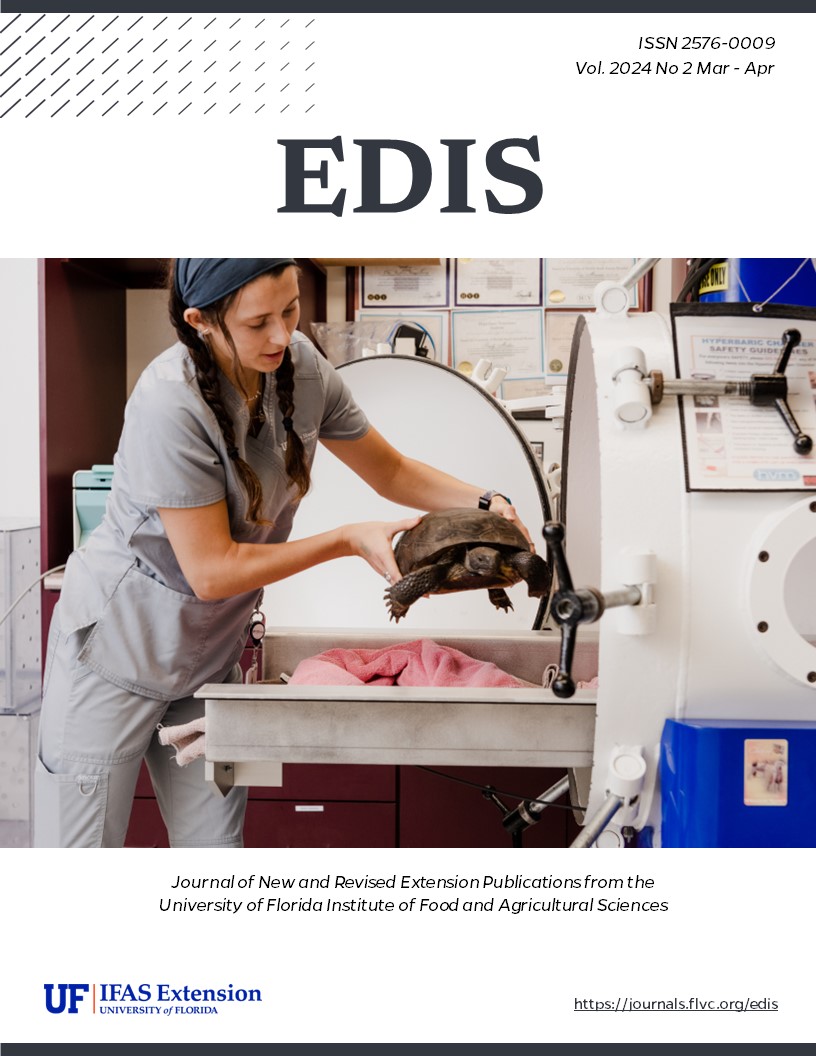Abstract
This article describes the identification, biology, and importance of the American sand wasps (Bembix americana Fabricius), which are a subspecies-complex of large, robust wasps in the subfamily Bembicinae. They nest gregariously in bare soil and provision their nests with flies (order Diptera). The females are progressive provisioners, meaning they continue to provide their developing larvae with prey until the larvae pupate. Males participate in a distinctive mating behavior called a “sun dance” in which groups of males fly low over nesting areas waiting for females to emerge so they can be the first to mate with them. Adults feed on flower nectar and can often be found visiting a variety of wildflowers. This species has a broad ecological range and can be found nesting in a variety of soil types and habitats.
References
Alcock J. 1972. Variation in cell number in a population of Bembix americana (HYMENOPTERA: Sphecidae). Psyche, 79(3), 158-164.
https://doi.org/10.1155/1972/36152
Brock RE, Cini A, Sumner S. 2021. Ecosystem services provided by aculeate wasps. Biological Reviews, 96(4), 1645-1675. https://doi.org/10.1111/brv.12719
https://doi.org/10.1111/brv.12719
Evans HE. 1966. The behavior patterns of solitary wasps. Bulletin of the Museum of Comparative Zoology, 11, 123-154.
https://doi.org/10.1146/annurev.en.11.010166.001011
Evans HE. 1970. Ecological-Behavioral studies of the wasps of Jackson Hole, Wyoming. Bulletin of the Museum of Comparative Zoology, 140(7), 451-511.
Evans HE. 2002. A Review of Prey Choice in Bembicine Sand Wasps (Hymenoptera: Sphecidae). Neotropical Entomology, 31(1), 001-011.
https://doi.org/10.1590/S1519-566X2002000100001
Evans HE, Matthews RW. 1968. North American Bembix, a revised key and suggested grouping. Annals of the Entomological Society of America, 61(5), 1284-1299. https://academic.oup.com/aesa/article/61/5/1284/93247
https://doi.org/10.1093/aesa/61.5.1284
Evans HE, O'Neill KM. 1981. Parental investment and sexual dimorphism in digger wasps (HYMENOPTERA: Sphecidae). University of Wyoming National Park Service Research Center Annual Report, 5(10), 58-63.
https://doi.org/10.13001/uwnpsrc.1981.2267
Evans HE, O'Neill KM. 2007. The Sand Wasps: Natural History and Behavior. Cambridge, Massachusetts: Harvard University Press.
https://doi.org/10.4159/9780674036611
Frank JA. 2022. The Biology and Research History of the Solitary Wasp Genus Bembix (Hymenoptera: Bembicidae): A Brief Review. Annals of the Entomological Society of America. https://doi.org/10.1093/aesa/saab050
McCorquodale DB. 1986. Digger wasp (Hymenoptera: Sphecidae) provisioning flights as a defence against a nest parasite, Senotainia trilineata (Diptera: Sarcophagidae). Canadian Journal of Zoology, 64, 1620-1627.
https://doi.org/10.1139/z86-244
Rau P, Rau N. 1918. Wasp Studies Afield. Princeton, New Jersey: Princeton University Press.
Spofford MG, Kurczewski FE. 1992. Counter-cleptoparasitic behaviours of species of Sphecidae (Hymenoptera) in response to Miltogrammini larviposition (Diptera: Sarcophagidae). Journal of Natural History, 26(5), 993-1012.
https://doi.org/10.1080/00222939200770591
Tanner DA, & Pitts JP. 2013. Effects of male size on searching behaviors in the sun dance of Bembix. Western North American Naturalist, 73(2), 254-257.

This work is licensed under a Creative Commons Attribution-NonCommercial-NoDerivatives 4.0 International License.
Copyright (c) 2024 UF/IFAS

